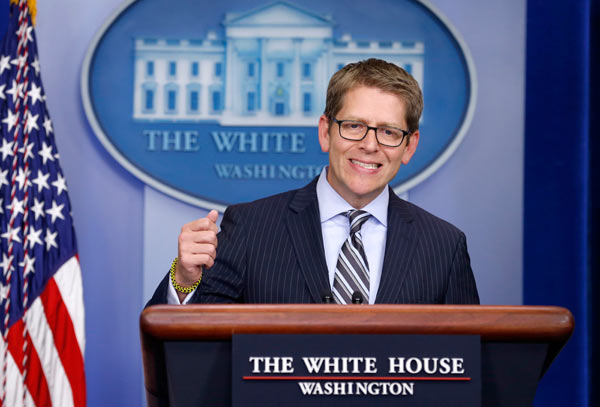

 |
|
White House spokesman Jay Carney briefs reporters from the White House in Washington October 10, 2013.[Photo/Agencies] |
WASHINGTON — Facing a fresh deadline, House Speaker John Boehner said Thursday that Republicans would vote to extend the government's ability to borrow money for six weeks — but only if President Barack Obama first agrees to fresh negotiations on spending cuts. Under the Republican plan, the partial government shutdown would continue in the meantime.
White House spokesman Jay Carney said that Obama "would likely sign" a clean bill increasing the debt cap but that the president also wants Republicans to reopen the government. He did not rule out Obama agreeing to Boehner's debt ceiling proposal if the government remains closed, but the White House made no promises that Obama would hold negotiations under those circumstances.
"He will not pay ransom in exchange for the Republicans in the House doing their job," Carney said.
Obama is to meet with Boehner and other House GOP leaders at the White House Thursday afternoon.
After weeks of decline, financial market indexes shot higher in anticipation of a possible deal that could avert a federal financial default. Both the Dow Jones industrial average and Standard & Poor's 500 index were up well over 1 percent in afternoon trading
"I would hope the president would look at this as an opportunity and a good faith effort on our part to move halfway, halfway to what he's demanded, in order to have these conversations begin," Boehner, R-Ohio, told reporters after presenting the plan to rank-and-file GOP lawmakers.
Boehner produced his proposal as the shutdown entered its 10th day. On that front, the administration said it would allow states to use their own money to reopen some national parks that have been closed.
Governors in at least four states — Utah, South Dakota, Arizona and Colorado — have asked for authority to reopen national parks within their borders because of the economic impact of the closures. Interior Secretary Sally Jewell said the government will consider offers to pay for park operations but will not surrender control of national parks to the states.
As for the deeper problem of the federal debt ceiling, the administration has warned that unless the limit is raised, the government will deplete its ability to borrow money by next Thursday, an event officials have warned could trigger a default that could wound the world economy as well as America's .
Obama has steadfastly insisted that Congress reopen the government and extend the debt limit without conditions. His acceptance of the GOP proposal could mean a brief resolution to the fight over the debt limit and a continuation of the shutdown while negotiations proceed.
Republicans have been demanding cuts in government programs, including Obama's 2010 health care law, and a bigger effort to cut long-term federal deficits as their price for reopening government and extending the debt limit.
Obama has repeatedly noted recent improvement in the deficit figures. After four years of trillion-dollar deficits, the 2013 shortfall is expected to register below $700 billion.
Some conservatives still expressed reservations with the Boehner plan. "I'm not very enthusiastic about that," Rep. Steve King, R-Iowa, said.
Under Boehner's offer, the House would also appoint negotiators to bargain with the Democratic-led Senate over a budget compromise. Those talks have been on hold for months, and the two chambers have deep differences over taxes and cuts in benefit programs.
Earlier Thursday, Treasury Secretary Jacob Lew warned the Senate Finance Committee that failure to renew the government's ability to borrow money "could be deeply damaging" to financial markets and threaten Americans' jobs and savings. It would also leave the government unsure of when it could make payments ranging from food aid to Medicare reimbursements to doctors, he said.
"The United States should not be put in a position of making such perilous choices for our economy and our citizens," the secretary said. "There is no way of knowing the irrevocable damage such an approach would have on our economy and financial markets."
The game of Washington chicken over increasing the debt limit — required so Treasury can borrow more money to pay the government's bills in full and on time — had sent the stock market south, spiked the interest rate for one-month Treasury bills and prompted Fidelity Investments, the nation's largest manager of money market mutual funds, to sell federal debt that comes due around the time the nation could hit its borrowing limit.
At the Finance committee hearing, Lew met incredulity from Republicans, who said the bigger problem was the soaring costs of benefit programs like Social Security and Medicare and the long-term budget deficits the country faces. Many expressed doubt about Lew's description of the consequences of default.
Sen. Mike Enzi, R-Wyo., said, "I think this is 11th time I've been through this discussion about the sky is falling and the Earth will erupt. Wyoming families aren't buying these arguments."
Replied Lew, "After they run up their credit card, they don't get to ignore it."
Meanwhile, the Senate gave final congressional approval to a bill ensuring that families of fallen troops be paid death benefits, which have been halted during the shutdown. Word that those payments had stopped prompted lawmakers of both parties to act to restore them.
In addition, the House voted 249-175 to finance border security and customs personnel through Dec. 15, the latest of the House GOP's bills aimed at reviving selected programs during the shutdown. The Senate has ignored most of the measures, saying the entire government must be restarted.







